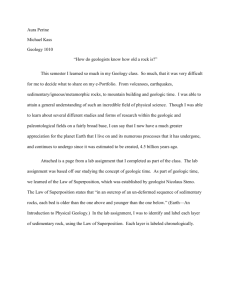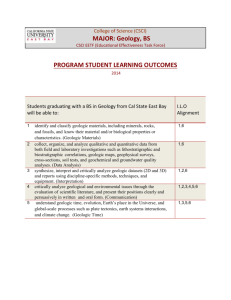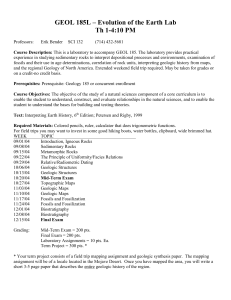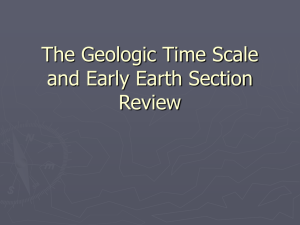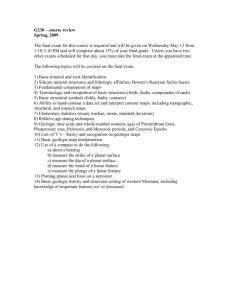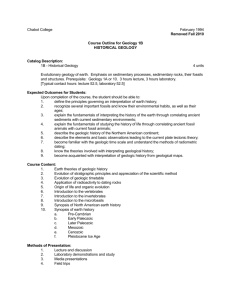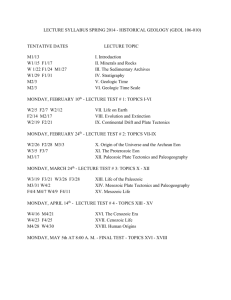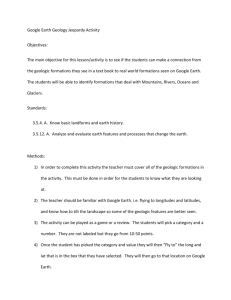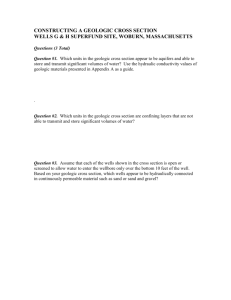Learning Outcomes
advertisement
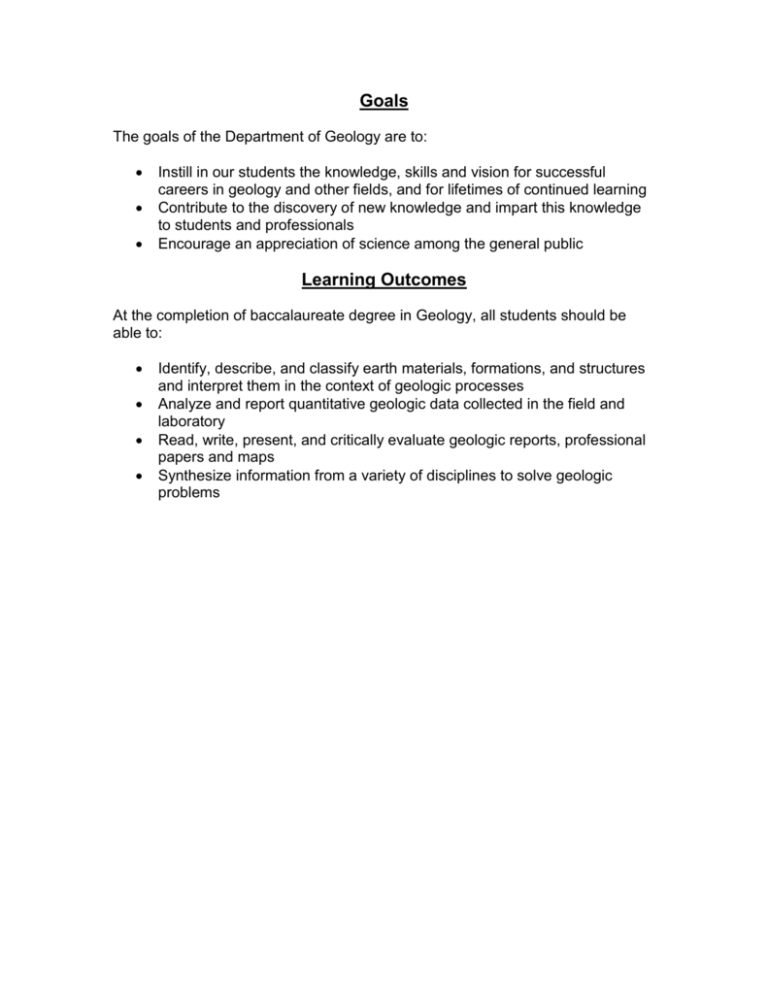
Goals The goals of the Department of Geology are to: Instill in our students the knowledge, skills and vision for successful careers in geology and other fields, and for lifetimes of continued learning Contribute to the discovery of new knowledge and impart this knowledge to students and professionals Encourage an appreciation of science among the general public Learning Outcomes At the completion of baccalaureate degree in Geology, all students should be able to: Identify, describe, and classify earth materials, formations, and structures and interpret them in the context of geologic processes Analyze and report quantitative geologic data collected in the field and laboratory Read, write, present, and critically evaluate geologic reports, professional papers and maps Synthesize information from a variety of disciplines to solve geologic problems Assessment Plan The following assessment strategies will be used to assess learning outcomes. Learning Outcomes for Undergraduate Majors Identify, describe, and classify earth materials, formations, and structures and interpret in the context of geologic processes Assessment Method Selected laboratory exercises in GEOL 302 (Earth Materials), GEOL 309 (Earth Structure and Tectonics) and GEOL 316 (Sedimentation and Stratigraphy) Field Trips Analyze and report quantitative geologic data collected in the field and laboratory Capstone course (GEOL 494 Field Geology) Selected exercises from homework assignments in GEOL 315 (Quantitative Methods) Selected laboratory exercises in GEOL 309 Capstone course Read, write, present, and critically evaluate geologic reports, professional papers and maps Senior thesis Selected laboratory exercises in GEOL 302 and GEOL 316 Capstone course Synthesize information from a variety of disciplines to solve geological problems Senior thesis Capstone course Senior thesis Define and conduct original research in the geological sciences Alumni Survey Senior thesis Rubrics for Assessing Program Learning Outcomes In the Department of Geology Each learning outcome should be evaluated on a scale of 1 (does not meet goals of learning outcome) to 3 (meets all goals of learning outcome) on each learning outcome. 1. Identify, describe, and classify earth materials, formations, and structures and interpret them in the context of geologic processes Students should be able to: o Observe and record the important aspects of earth materials, formations, and/or structures o Integrate observations, inferences and relationships of earth materials, formations, and/or structures to infer the geologic processes that produced them o Gather and evaluate information pertaining to earth materials, formations, and/or structures from multiple sources and/or sub-disciplines in geology 2. Analyze and report quantitative geologic data collected in the field and laboratory Students should be able to: o Interpret graphs and charts of quantitative data o Interpret basic statistics o Select data collection and analysis techniques appropriate for problem o Integrate quantitative data from multiple sources and/or sub-disciplines in geology 3. Read, write, present, and critically evaluate geologic reports, professional papers and maps Students should be able to: o Understand and use appropriate terminology o Direct writing and presentations to appropriate audience o Identify whether or not writing contains: clear focus, adequate development of arguments or points, clear and coherent paragraphing, appropriate use of examples and evidence, appropriate word choice, and appropriate sentence structure o Identify whether or not presentation contains: articulation, voice projection, bodily response, organization, use of examples, and variations in pitch, intonation, volume, and pause o Structure writing and presentations so that they contain an introduction, conclusion, and arguments that follow logically and support the thesis o Use transitions to connect sentences, paragraphs, and arguments o Provide evidence for conclusions and arguments o Locate and/or create, and effectively incorporate images into texts and presentations o Discuss credibility of sources o Analyze sources to determine their relevance to the topic o Fully and correctly cite sources, using a standard citation format 4. Synthesize information from a variety of disciplines to solve geologic problems o Synthesize information from geologic samples, field observations, maps, texts, photographs, diagrams, charts, tables, and other information sources to determine and describe a solution to a geologic problem. In addition, students completing the Bachelor’s of Science degree in Geology should be able to: Define and conduct original research in the geological sciences Student should be able to: o Identify a meaningful research problem in geology o Determine methods appropriate to the discipline to study the problem o Collect relevant data and conduct appropriate analyses o Interpret results and drawn significant conclusions o Prepare an effective written document and oral presentation reporting on the research project
